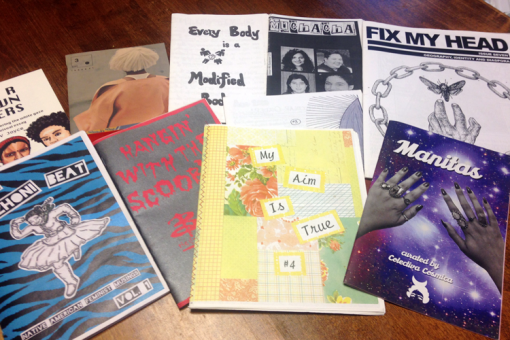 A photo of zines in the collection. (From left to right): TOP: Fear Brown Queers by Jacob V. Joyce, 3 Dot Zine Issue 1 by Devin Morris, Every Body is a Modified Body, Muchacha Zine #6: The Case of the San Antonio Four and Other Legal Injustices by Daisy Salinas, Fix My Head #7 edited by Anna Vo. BOTTOM: The Nizhoni Beat: Native American Feminist Musings Vol. 1 by Melanie Fey and Amber McCrary, Hangin’ with the Scoobies: A Buffy the Vampire Slayer Fan Zine by Kiernan Dunn, Think about the Bubbles #8: Trust the Knife by Joyce Hatton, My Aim is True #4 by Carrie Colpitts, Manitas curated by Colectiva Cósmica. Photo via.
A photo of zines in the collection. (From left to right): TOP: Fear Brown Queers by Jacob V. Joyce, 3 Dot Zine Issue 1 by Devin Morris, Every Body is a Modified Body, Muchacha Zine #6: The Case of the San Antonio Four and Other Legal Injustices by Daisy Salinas, Fix My Head #7 edited by Anna Vo. BOTTOM: The Nizhoni Beat: Native American Feminist Musings Vol. 1 by Melanie Fey and Amber McCrary, Hangin’ with the Scoobies: A Buffy the Vampire Slayer Fan Zine by Kiernan Dunn, Think about the Bubbles #8: Trust the Knife by Joyce Hatton, My Aim is True #4 by Carrie Colpitts, Manitas curated by Colectiva Cósmica. Photo via.
Zine FAQ
Like ZEEN, or the end of magazine. As in zine queen or a mean, green, zine machine.
Grounded in underground print culture, zines are self-published works made for passion instead of for profit.
Unfortunately, no. Zines are for in-library use only.
Any way you want! We have zine making supplies in the Sarah Doyle Center, including magazines, scissors, glue sticks, a photocopier, and even an electric typewriter. Here’s a guide for making a one-page mini zine and a guide for getting started publishing zines. Remember that your page count should be divisible by four (including your front and back cover) or it won’t print correctly!
Most definitely! Two copies are preferred, but not required. Please note the collecting scope when considering donations.
Yes! You can cite zines as primary sources. Because many people making zines don't have access to mainstream publishing, citing zinesters recognizes the importance of people for their humanity, knowledge, and experiences, not for their academic access.
Many zinesters treat zines like a diary and never wanted it put up online. Unless the zinester explicitly gives permission (like in the case of Queer Zine Archive Project), zines should not be digitized. While covers are generally okay, this means you should not post the contents of a zine on social media!
Besides the Sarah Doyle Center and Pembroke (which of course you should come to!), Providence has a vibrant print culture. There’s the Queer and Trans Zine Fest, the Dirt Palace, Providence Comics Consortium, RISD Zine Collection at the Fleet Library, and the RISD (un)bound art book fair. You can also take zine and printmaking classes at AS220.
Broken Pencil mag is a great way to get tapped into the scene. So are Tumblr, Twitter, and Etsy. Read some zines on QZAP. But most importantly, go to a zine fest near you if you can! Enjoy!
